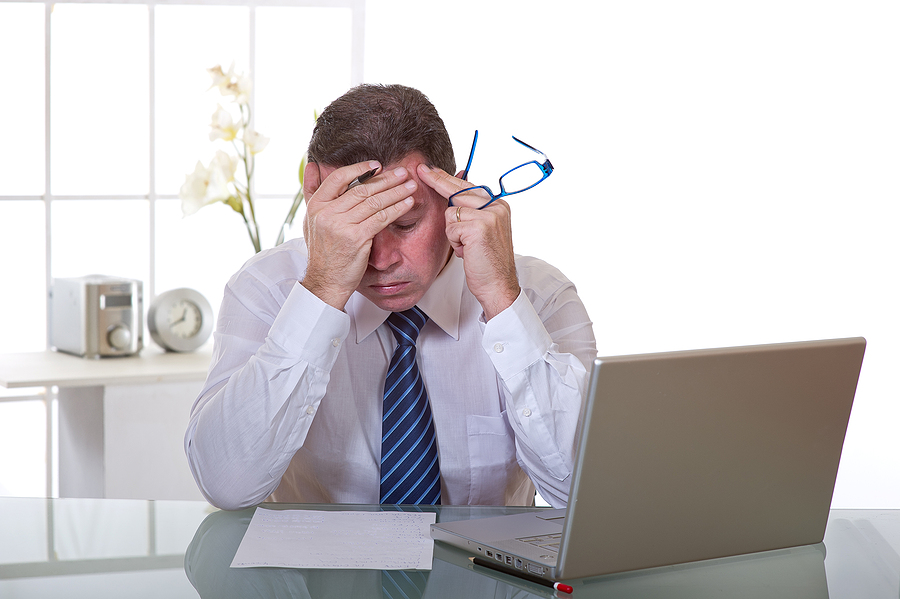June 21, 2024

Men, do you ever feel like you can’t focus well at work? Are you forgetful? Are you losing your self-confidence? Do you sometimes feel down and blue? Believe it or not, a decline in testosterone levels could be the culprit. Testosterone is normally thought of for helping build strong muscles and improving libido, however it has a profound effect on your brain, as well.
There are many reasons that a man’s testosterone levels may decline, but one of the inevitable reasons is with age. Have you hit your 40s or 50s and feel grumpy all the time? Have you lost the motivation and drive to continue to excel in your career?
Hormones are powerful. Just as when women have a decline in their progesterone and estrogen, men also feel the differences in how they think and feel when their testosterone declines. It is very real, and there is something you can do about it.
1. Irritability
You’ve surely heard the term “grumpy old man” used at one time or another. Has this become you? How did you go from being a happy, positive man to feeling like the grinch? Yes, that decline in testosterone could very well be the cause.
In fact, research concludes that testosterone replacement therapy in men with low testosterone levels improved their positive mood parameters, such as energy, well/good feelings, and friendliness and decreased negative mood parameters including anger, nervousness, and irritability. (1)
2. Depression
Although depression is more prevalent in women when compared to men, the prevalence of depression in men increases with age as testosterone levels drop. Research shows that in depressive disorders with decreased libido and low testosterone, testosterone replacement therapy was effective. (2)
Observational studies on older men revealed that their depressive symptoms are associated with low testosterone. On the other hand, in both men and women, testosterone supplementation leads to improvement of depressive symptoms. In a meta-analysis of the effects of testosterone on depression, the antidepressant effect was positive, at least in patients suffering from hypogonadism (2)
3. Anxiety
Anxiety seems to be most sensitive to testosterone. Research demonstrates that testosterone supplementation decreased anxiety and that the anti-anxiety effect of testosterone is dose-dependent. Stress induced during gestation resulted in both reduced testosterone and increased anxiety of the adult male. (2)
4. Memory Loss
The positive effect of testosterone on memory was well documented in both men, as well as women. Numerous clinical studies in postmenopausal women and men in andropause showed improvements of learning and memory after testosterone supplementation. Even a short six week testosterone treatment resulted in improved spatial and verbal memory of older men. Testosterone has even showed a positive effect on spatial and verbal memory in Alzheimer’s Disease patients. (2)
5. Decline in Sense of Well-Being
Research indicates that the most frequent reasons men gave for taking prescription testosterone were low testosterone (37.1%), well-being (35.2%), energy (28.7%), libido (21.9%), and social energy (19.4%); older men claimed libido as a motivation for testosterone initiation more frequently than younger men. (3)
6. Increase Risk of Alzheimer’s Disease and Dementia
A research study examined the associations of testosterone levels and sex hormone-binding globulin levels with the incidence of dementia and Alzheimer’s Disease in men. Results demonstrated that lower total testosterone and higher sex hormone-binding globulin levels are independently associated with higher levels of dementia and Alzheimer’s Disease in older men. (4)
Harriss’ Story
Harriss experienced lack of energy, motivation and focus. He couldn’t think clearly and it was difficult to set business goals. He gained weight and wanted to rest all the time. Watch to learn how Harriss got his energy, mental focus and zest for life back!
Take our Symptom Checker Quiz now to find out. It only takes a couple of minutes. Call our Wellness Consultants for a complimentary wellness consultation at 281-698-8698. It will be our privilege to serve you!
Research:
1. Testosterone Replacement Therapy Improves Mood in Hypogonadal Men – A Clinical Research Center Study
2. On the Effects of Ttestosterone on Brain Behavioral Functions
"*" indicates required fields
Since 1989, Hotze Health & Wellness Center has helped over 33,000 patients get their lives back using bioidentical hormones that restore hormones to optimal levels, strengthen immune systems, and increase energy levels. Our treatment regimen addresses the root cause of hypothyroidism, adrenal fatigue, menopause, perimenopause, low testosterone, allergies, and candida.
Led by best-selling author, radio host and leading natural health expert, Steven F. Hotze, M.D., our medical team has over 100 years’ combined medical experience backed by a staff of nearly 100 caring professionals who provide an environment of hope and extraordinary hospitality for each of our patients, who we call our guests. It is our deepest desire to help you obtain and maintain health and wellness naturally so that you may enjoy a better quality of life, pure and simple.
Do you want to live a healthy, happy, purpose-driven life? Do you want to restore your health so that your loss of energy, weight gain, joint pain, depression and lack of drive or motivation won’t hold you back from achieving your personal and professional goals?
Dr. Steven Hotze wants that for you, too. In fact, in his powerful and passionate video entitled, “What I Believe”, Dr. Hotze shares how his Christian worldview and pivotal experiences have ignited a deep desire to offer the message of hope and optimal health to all who need to hear it.









At Hotze Health & Wellness Center, our doctors are changing the way women and men are treated through the use of bioidentical hormones. Our natural treatments have helped over 33,000 individuals with hypothyroidism, adrenal fatigue, menopause, perimenopause, low testosterone, allergies, candida, detoxification and nutritional deficiencies.
Meet our doctors"After just 3 weeks into the program, my joint pain was gone, climbing stairs became easy, my energy level increased from 2 to a 9 (out of 10) and I lost almost 30 pounds! ”
Leave a Reply